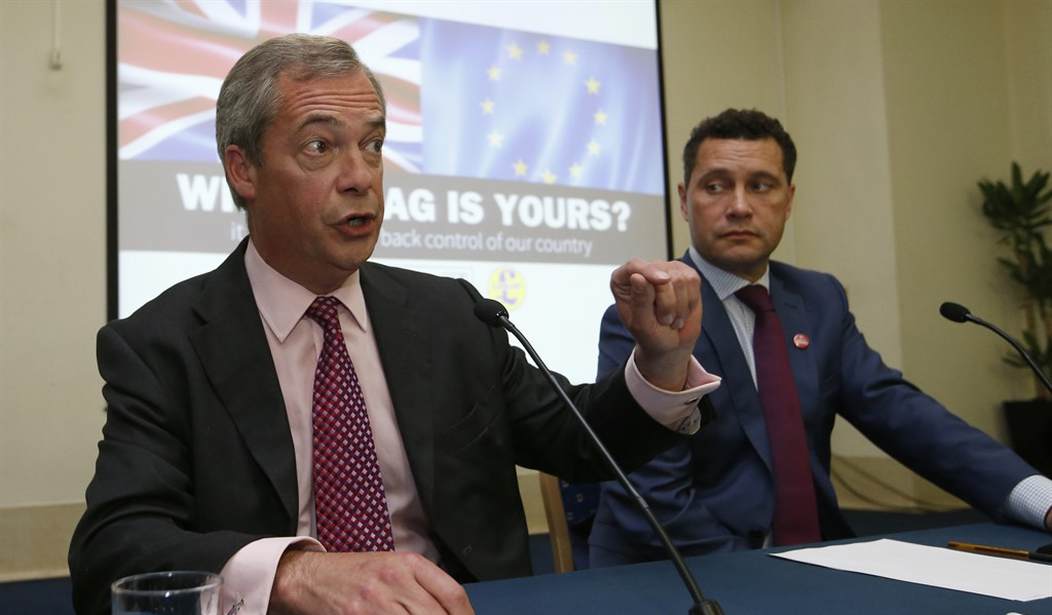Earlier this month, talk show host and former Brexit Party leader Nigel Farage wrote an editorial in The Telegraph titled, “After my banking travails, I fear Britain is lost,” detailing his nightmare experiences with NatWest, one of Britain’s biggest banks. Farage told the tale of his accounts being deleted and his friends, family, and business associates being harassed for their political beliefs.
PJ Media’s Athena Thorne covered Farage’s allegations.
He goes on to detail his financial ostracization as bank after bank refused to accept his business, and he gives examples of other politicians — always conservative — to whom it has also happened. Not only are these victims “unpersoned” and rendered unable to conduct business or even function in society, but they also face psychological extortion from vast, faceless institutions as their family members suffer the same fate. Basically, the banks tell the target, “Step down from politics or the kid gets it.”
Now, the CEO of NatWest, Alison Rose, has been fired for discussing Farage’s personal details with a journalist. Rose is leaving “by mutual consent,” the bank said. The bank’s action came just hours after they had expressed full confidence in Rose.
“It is a sad moment,” said the bank’s chairman, Howard Davies.
The Associated Press reports on a BBC story that claimed Coutts Bank, a subsidiary of NatWest and Farage’s bank for 43 years, required a million pound borrowing requirement and that the bank didn’t cancel Farage’s accounts because of politics.
But Farage had the goods on them, and his publication of documents detailing the bank’s lies almost certainly led to Rose’s firing.
Farage then published documents he had obtained from the bank showing that officials discussed his financial affairs, but also the “reputational damage” associated with keeping him as a customer. The documents said Farage was “seen as xenophobic and racist” and “considered by many to be a disingenuous grifter.”
Farage, a skilled seeker of attention and generator of outrage, accused the bank of stomping on his freedom of speech, and some members of the Conservative government echoed his concerns.
Farage repeatedly failed to get elected to Parliament during his political career but played an outsized role in taking Britain out of the European Union, in large part by stoking concerns about immigration. Voters narrowly backed Brexit in a 2016 referendum, and the U.K. left the bloc in 2020.
The banking minister, Andrew Griffith, met executives from Britain’s largest banks on Wednesday morning to discuss concerns related to customers’ “lawful freedom of expression.”
Related: The BBC Had to Apologize After a Reporter Asked an Unbelievably Stupid Question
Griffith told the representatives of Britain’s most powerful banks, “it’s not the job of banks to tell us what to think or what political party we should support.”
“In a democracy that relies upon freedom of expression, freedom of thought, that isn’t a legitimate thing for a bank to remove someone’s access to a bank account, a really important building block of society today,” he said.
Well spoken. But I fear it won’t matter that much.
Britain’s Treasury announced last week that U.K. banks will be subject to stricter rules over closing customers’ accounts. Under the new rules, they will have to explain why they are shutting down someone’s account and give 90 days’ notice for such account closures. They previously have not had to provide a rationale for doing so.
The changes are intended to boost transparency for customers but will not remove a banking firm’s right to close accounts of people deemed to be a reputational or political risk.
Give these people an out, and their sanctimonious justifications for canceling someone whose political views they disagree with will continue.










Join the conversation as a VIP Member